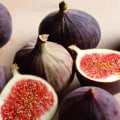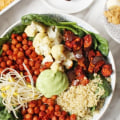Here are 11 foods and food groups you should try to include in your vegan diet plan. However, legumes also contain a good amount of antinutrients, which can reduce mineral absorption (. For example, iron absorption by plants is lower than that of animal origin. Similarly, vegetarian diets appear to reduce zinc absorption by approximately 35% compared to those containing meat (4, 5,.
To increase the absorption of iron and zinc in legumes, you can also avoid consuming them at the same time as calcium-rich foods. Calcium can hinder the absorption of these nutrients if consumed at the same time (. On the other hand, eating legumes in combination with fruits and vegetables rich in vitamin C can increase iron absorption (. In addition, nuts and seeds are excellent sources of iron, fiber, magnesium, zinc, selenium, and vitamin E.
They also contain a good amount of antioxidants and other beneficial plant compounds (1) Try to choose unbleached and unroasted varieties whenever possible, as nutrients can be lost during processing (1). Research also shows that the fats found in hemp seeds can be very effective in reducing symptoms of PMS and menopause (14, 15, 1). They can also reduce inflammation and improve certain skin conditions (1). On the other hand, chia seeds and flaxseeds are particularly high in alpha-alpha linolenic acid (ALA), an omega-3 fatty acid essential for your body that can be partially converted to eicosapentaenoic acid (EPA) and docosahexaenoic acid (DHA).
EPA and DHA play important roles in the development and maintenance of the nervous system. These long-chain fatty acids also appear to have beneficial effects on pain, inflammation, depression and anxiety (18, 19, 20, 2). However, it's not clear if the type of vitamin B12 found in tempeh is active in humans. The amount of vitamin B12 in tempeh is also still low and may vary from one brand of tempeh to another.
Therefore, vegans should not rely on tempeh as the sole source of vitamin B12 (26, 2). Seitan is another popular alternative to meat. Provides approximately 18 grams of protein per 3.5 ounces (100 grams). It also contains iron, calcium and phosphorus (2).
Vegans tend to consume smaller amounts of calcium per day than vegetarians or meat eaters, which can negatively affect their bone health. This seems especially true if calcium intake falls below 525 mg per day (29, 30). Calcium-fortified vegetable milks and yogurts are generally also fortified with vitamin D, a nutrient that plays an important role in calcium absorption. Some brands also add vitamin B12 to their products.
Therefore, vegans seeking to achieve their daily intake of calcium, vitamin D and vitamin B12 through food only should opt for fortified products. To keep added sugars to a minimum, you can choose sugar-free versions. Two tablespoons (30 ml) of these provide approximately 8 grams of protein. In addition, seaweed contains magnesium, riboflavin, manganese, potassium and good amounts of antioxidants (3).
Some types of seaweed, such as seaweed, nori, kombu, and wakame, are excellent sources of iodine. Some other varieties, such as spirulina, contain less (32) 3.Until more is known, vegans who want to achieve the recommended daily intake of vitamin B12 should consume fortified foods or talk to a health professional about taking supplements. One ounce (28 grams) contains approximately 16 grams of protein and 6 grams of fiber. In addition, nutritional yeast is often fortified with B vitamins, including vitamin B12 (3).
Therefore, fortified nutritional yeast can be a practical way for vegans to meet their daily vitamin B12 needs. These techniques increase the amount of beneficial nutrients that are absorbed in plant foods and can also improve your overall protein quality (39, 40, 41, 4). Interestingly, germination may also slightly reduce the amount of gluten found in certain cereals (39, 4). They also contain vitamin K2, which can promote bone and dental health, as well as help lower the risk of heart disease and inhibit the growth of cancer cells (44, 45, 46, 4).
For example, old grains, felt, and teff contain 10.7 and 9.7 grams of protein per cooked cup, respectively (48, 4). Pseudocereals) Amaranth and quinoa rank second with 9.3 and 8.1 grams of protein per cooked cup, respectively (50.5). Choline can be found in small amounts in a wide variety of fruits, vegetables, nuts, legumes, and cereals. The plant foods with the highest amounts are tofu, cauliflower and quinoa (52, 53, 5).
Daily choline requirements increase during pregnancy. People who drink a lot of alcohol and postmenopausal women may also have a higher risk of deficiency (54, 55, 5). Iodine is often left out of the debate over vegan nutrition, but it's an important mineral that's crucial to thyroid health. When people think of a vegetarian diet, they usually think of a diet that doesn't include meat, poultry, or fish.
Vitamin A is a fat-soluble vitamin, which means you need to eat some fat so your body can absorb it. Fortified foods and vegetable meats can be key sources of important nutrients, and it's also important that foods are enjoyable. You can eat them alone or combine them in interesting recipes such as sauces, desserts and vegan cheeses. This vitamin is found almost exclusively in animal products, so it can be difficult to get enough vitamin B-12 on a vegan diet.
Eat a few servings of green and orange leafy vegetables every day to make sure you get enough vitamin A. If you don't eat enough fortified foods and have limited exposure to the sun, you may need a vitamin D supplement (one derived from plants). Vitamin C helps the body absorb iron from these foods, so be sure to eat a food that contains vitamin C with these foods. Proteins are found throughout the vegetable kingdom, especially in legumes, including beans, peas, lentils, peanuts and soy foods, such as tofu, tempeh and vegan soy-based meats.
The information presented here should not be interpreted as medical advice or used to diagnose, treat, cure or prevent any condition or disease. Make sure you eat foods rich in vitamin C, such as oranges, peppers, strawberries, kiwis, cauliflower and tomatoes, when you eat iron-rich foods. Vegans should have no problem getting enough vitamin C if they eat several servings of fruits and vegetables a day. However, a vegan eating pattern can still contain all the important vitamins and minerals your body needs.
. .


